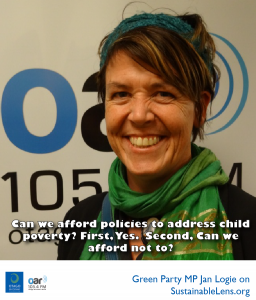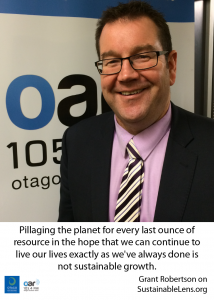Can we afford policies to address child poverty? First, Yes. Second, Can we afford not to?
Jan Logie is a Green MP. Before becoming an MP Jan worked widely in New Zealand social and human rights organisations. She is Greens spokesperson for Income Support, Immigration, Women, Pacific Island Affairs, Ethnic Affairs, Human Rights, Rainbow Issues, Overseas Development Aid and Associate for Housing. We begin by asking if there is a common thread running through all those areas.
Talking points:
A lot of what is going wrong in our society is around unbalanced power. That’s around people access to things and it’s also around treatment of the planet.
I’ve always been bemused by people making social justice separate from environmental issues – it seems to me that the people messing up our planet are the same people with the wealth and the resources. They are able to do both of those things because they have too much power – an uneven share of power.
Go out and listen to people, rather than tell.
I really want everyone to be able to live up to their potential and live free lives. Domestic and sexual violence are massive barriers to that in New Zealand…epidemic rates…1 in 3 women likely to experience intimate partner violence in their lifetime. In terms of sexual violence, the figures for girls are around 1 in 4, and for boys between 1 in 6 and 1 in 10 are likely to be sexually abused in this country… that’s horrific.
For some people the silence around these issues and the blame around these issues, will mean that they won’t get the help that they need…the consequences of that violence will be really compounded.
We need to make this a priority for us to deal with as a country.
We had a bit of a spate of taking it seriously politically, and then it went off the agenda, it’s almost like “oh we tried…there’s nothing more we can can do”. We’re starting to get another wave of a response, of people saying “this is ridiculous”. It doesn’t have to be like this, we need the systems responses, government departments to actually do what they need to do in response. And they’re not. The systems have been breaking down terribly.
It is absolutely a result of decisions made around the Cabinet table. Womens Refuges have had their baseline funding reduced over the last six years.
(On banknotes getting $80M but sexual violence advocates struggling) It’s just skewy values.
The women’s vote can swing an election.
What is primarily (but not exclusively) male violence against women is founded on a sense of entitlement…and that is founded on women having a lesser place in society.
Trickle down has been so thoroughly discredited, yet we hear it all the time….(To see how it doesn’t work)…you only have to look at how productivity has increased so much more than wages.
Child poverty is outrageous. A quarter of our children living in poverty. Numbers are disputed, but it was about 10% in the 1980s, and now it is around a quarter. And the levels of severe deprivation have increased.
They aren’t getting enough food, they don’t have warm houses, their houses are damp, they don’t have proper clothing, or shoes without holes.
Houses full of nothingness.
We’re taking out all of the things that help our children and young people grow and learn and thrive – they’ve just been sucked out of their lives by government policies.
Think about how important the first seven years are to someone’s entire life – and what we are doing to them, and as a consequence to all of us. It will require much more expensive interventions later, and it’ll never be an even playing.
To make inter-generational changes: start. Go beyond piecemeal.
Claims that you just need to be out working, shows a lack of understanding of the complexity of people’s lives and what we consider work. There’s also not enough jobs. And what about people with disabilities…are we saying that they’re not deserving to participate in society? And the value of parenting? And because levels of social harm haven’t been fully addressed…and not everyone is going to fit into our ultra-efficient high performing world. Some people fit into that and some people don’t – are we saying that they don’t deserve to be able to live a decent life?
There’s a really strong interaction between income support and work policies, we need to make people help make those links. It is in most of our interests to drive towards a high wage economy, where part of that economy is a decent social security system.
I’m getting a sense that there is a cultural shift away from individualism.
A meritocracy, deserving/undeserving poor concept rests on an individualistic approach. I’m sensing a cultural shift towards recognising our interdependence and the links between us.
The world, sadly, is proving our policies right. (would you like to be wrong on some of them?) Absolutely.
That’s the biggest question facing any movement for social change. How do we get there? The policies are clear, but it’s how do we bring people to the idea that those policies might actually work, that we all have something to gain from these policies.
There’s too big a gap between parliament and our social movements.
I see amazing people doing amazing things, and think this is really exciting, how do we create the tipping point of cultural understanding?
New Zealand has had a really vibrant civic society, that has characterised our society…the weakening of that it a huge lose to our society.
In my heart I’m an activist. But maybe I’m too deeply compromised as a politician…I like to think I’m an activist-politician.
The whole world feels a better place if you are active and trying to create the world you want.
(Miracle question) If everyone suddenly got that we’re all in this together.
Resources:
Bryan Bruce’s survey of political parties on child poverty.
Patricia Widener who discussed the role of activism and social movements.



